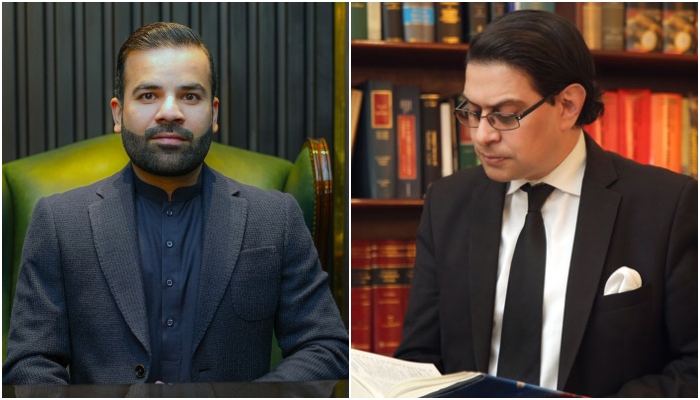

- Govt considering proposal to extend judges’ retirement age: Malik.
- “Have required numbers to present bill in lower house.”
- Raja says amendment aims at extending favoured judge’s tenure.
The Pakistan Tehreek-e-Insaf (PTI) has cast doubts over the much-touted ‘constitutional package’ and termed it an “individual-specific legislation,” with the government alluding to revising the seniority principle in the appointment of the Chief Justice of Pakistan (CJP).
At present, according to Article 175A of the Constitution, only the senior most judge of the Supreme Court is appointed as the CJP on the basis of principle of seniority.
“Three to four options are [under consideration], including the seniority principle in appointment of top judge,” Barrister Aqeel Malik, government’s spokesperson on legal affairs, said while speaking on Geo News programme, ‘Naya Pakistan’.
CJP Qazi Faez Isa is set to retire in October this year, but as his retirement draws near, rumours of an "extension" in his tenure through judiciary-centric legislation in parliament have been rife.
However, the Centre as well as the chief justice denied such reports with the latter clarified that he would not accept any "individual specific" proposal on fixing the tenure of the country's top judge.
Today, Barrister Aqeel confirmed that the draft on “law reform or legal reform” would not be a person-specific, adding that the government was introducing the judicial reforms with “good intentions”.
“Even [JUI-F chief] Maulana Fazlur Rehman also said that only seniority should not be considered for CJP’s appointment,” the spokesperson said while referring to the JUI-F chief's Thursday's National Assembly speech wherein the opposed the idea of extending tenure of the top government functionaries.
Maulana Fazl proposed that not only seniority but the capability of the judge should also be taken into account.
In response to a question, Barrister Malik also confirmed that a proposal seeking to extend the retirement age of superior courts’ judges was also under consideration — which he said would not be person-specific and would apply to all judges. “The legislation, if presented, would not violate anyone’s fundamental rights.”
However, the spokesperson said the government hasn’t finalised any option regarding judicial reform to table in parliament.
“We have the required number for presenting the bill in the lower house,” he said, pointing out that the Supreme Court has declared 41 lawmakers as "independents" in its recent judgement. “The opposition will note whoever gives their vote.”
Malik was referring to the apex court’s July 12 verdict that declared the Pakistan Tehreek-e-Insaf (PTI) eligible for reserved seats and allowed its lawmakers who joined the Sunni Ittehad Council (SIC) following February 8 elections to join the Imran Khan-founded party.
Meanwhile, PTI’s Salman Akram Raja denied the government’s claim and said: “Constitutional reform aims at extending tenure of one favoured judge.”
He remarked that no one, including CJP Isa, should accept the amendment, adding that appointing a “blue-eyed” one among five judges would destroy the institution. “They are making attempts to subdue Supreme Court in every possible way.”
Praising Fazlur Rehman for his commitment to upholding democratic values, Raja said the veteran politician knows “why such things are being carried out”.
Responding to a question related to government's claim that it has achieved required number for the constitutional amendment in the lower house, the PTI leader said that the "government would complete the numbers only through coercion". “Our lawmakers were picked up immediately after the SC’s July 12 verdict,” he added.












